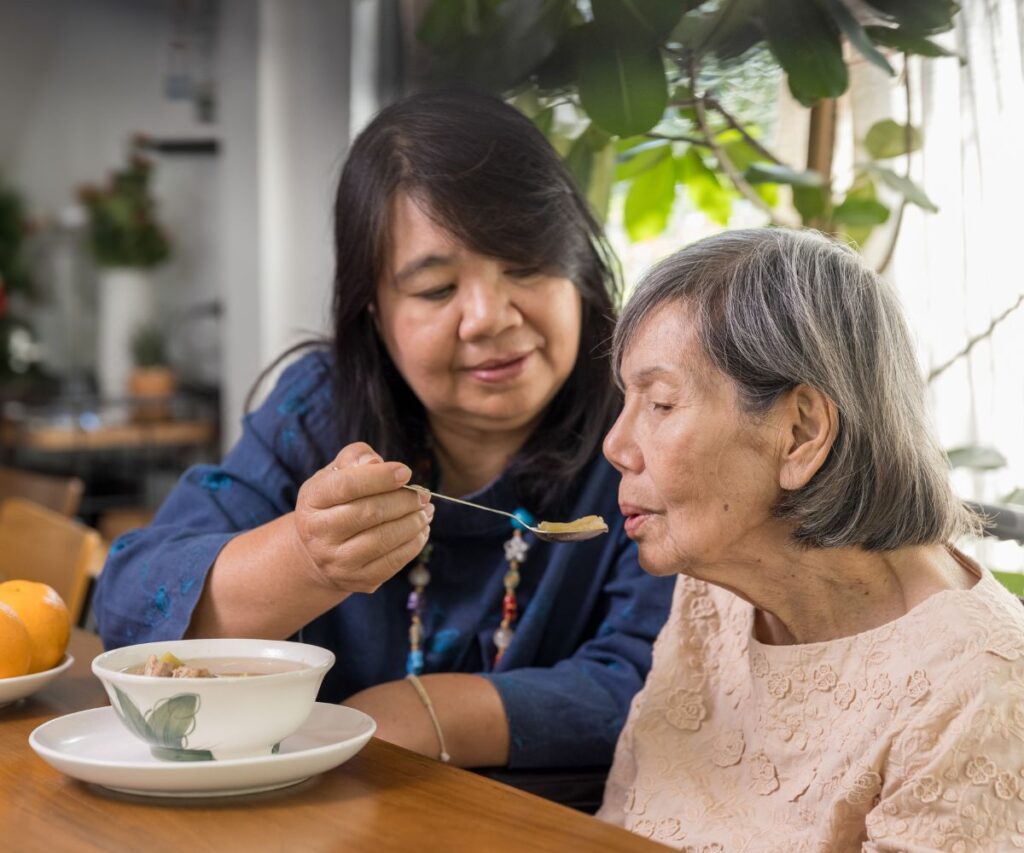Practical Tips for Family Caregivers to Combat Burnout
November 8, 2024

Practical resources to support the emotional, financial, and respite needs of family caregivers to promote personal wellbeing as they provide essential care for loved ones.
It’s estimated that over 53 million family caregivers in the U.S. provide vital care for loved ones who need support to live their daily lives. This care is valued at over $600 billion each year, but that number doesn’t fully reflect the emotional, physical, and financial weight of the role.
While caring for someone you love can be incredibly rewarding, it often involves being on call 24/7 and dealing with stressful situations, which commonly leads to burnout and compassion fatigue. Even the most dedicated caregivers need time to recharge, and knowing what resources are available can make a big difference in finding the balance they need to keep going.
In honor of National Caregivers Month, which happens annually every November, we offer a look into the role that family caregivers play and share practical resources to support their emotional, financial, and respite needs as they provide essential care for their loved ones.
Family Caregivers and the Essential Role They Play
A family caregiver is someone who provides a wide range of support to a relative or close friend dealing with a chronic health condition, disability, or functional limitation. The type of care they offer depends on their loved one’s specific needs, but it generally falls into three main categories: personal care, medical care, and everyday life management.
Personal care includes supporting with tasks like bathing, dressing, and maintaining personal hygiene. Medical care might involve tasks such as organizing, providing, and monitoring medications, managing medical treatments, scheduling doctor’s appointments, or coordinating with healthcare professionals. Life management tasks cover a wide range of activities, such as finance management, transportation needs, grocery shopping, and anything else required to ensure their loved one can continue to live safely and comfortably at home.
In short, caregiving is about supporting the person’s overall wellbeing, helping them maintain their independence, and ensuring their daily needs are met.
Resources Available to Support Family Caregivers
Caring for a loved one can sometimes feel overwhelming, leading to feelings of loneliness, isolation, financial strain, and mental fatigue. The demands of caregiving—often unpaid and physically and emotionally taxing—can take a toll on even the most dedicated caregivers. However, it’s important to remember that there are resources and support systems available to help lighten the load and provide caregivers with the assistance they need to stay resilient and balanced.
Here are a few of them.
Emotional Support to Combat Feelings of Isolation
Support groups are key to combating the feelings of loneliness and isolation that are common among caregivers. Support groups—whether in-person or online—provide solidarity, recognition, and the opportunity to exchange ideas to help with caregiving.
Some places to find support groups include faith institutions, medical centers, and local service agencies.
A few resources to consider:
- The Eldercare Locator, a public service of the Administration for Community Living, has a hotline at 1-800-677-1116 that can help find local services for older adults and their families.
- Parent to Parent Colorado connects families of individual with disabilities or special healthcare needs with resources and emotional support.
- Courage to Caregivers offers support for caregivers of loved ones with mental illness, focusing on caregiver burnout prevention.
- The AARP’s blog on finding the right caregiver support group offers a list of support groups or places to search for support groups.
Sometimes just discovering an article that outlines an experience like yours can provide relief and make you feel less alone. Check out the AARP’s blog page for articles written specifically for caregivers on a range of different topics.
Financial Support to Combat Financial Strain
Caregiving for a loved one often means cutting back on work hours or leaving the workforce altogether, leading many to struggle with financial strain. Lost income and out-of-pocket expenses for supplies, treatments, and home modifications are common financial burdens. While these sacrifices can weigh heavily, there are financial support options available to ease some of the financial pressures associated with caregiving and provide a pathway to a more balanced and sustainable caregiving experience.
ARCH National Respite Network’s article “How Do I get Paid to be a Family Caregiver?” is information-packed and explains many different ways to get financial relief as a family caregiver.
Local resources include:
- The Denver Mill Levy Program, which offers Denver residents with intellectual and developmental disabilities and their families a variety of wraparound supports to help people live healthy and fulfilling lives. These supports include funding for basic needs, training and support for caregivers, and a wide range of services or items such as therapies, day programs, camps, etc.
- AbbyCare, which supports Denver parents and caregivers in receiving hourly compensation for caregiving for their child with disabilities or special needs.
- Easterseals Colorado offers information about how to get compensation for your caregiving duties in Colorado.
Respite Support to Combat Exhaustion and Burnout
Caregiving for a loved one is both demanding and constant, making regular breaks essential for sustained wellbeing. Respite care provides temporary support and care for the loved one, giving the caregiver a chance to rest and recharge.
Respite care takes many forms, all of which provide temporary relief from caregiving duties. Below are several forms of respite care.
- In-home respite care: In-home respite care allows a caregiver to take a break while a professional caregiver provides care in the home. This can be arranged for a few hours, overnight, or even for extended periods.
- Adult day centers: Adult day care provides daytime care and socialization for adults, offering caregivers a break during working hours with services such a supervision, meals, and recreational activities.
- Facility-based respite care: Facility-based respite care provides short-term stays in a nursing home, assisted living facility, or a respite center. This option is ideal when the caregiver needs a break for several days or longer.
- Community or faith-based respite programs: Some community organizations or faith-based groups provide volunteers or low-cost respite services for family caregivers. These are varied, but often include short-term in-home visits or day activities designed to give caregivers a break.
Local and national respite resources include:
- National Respite Locator Service is a comprehensive online resource with nationwide respite services to support family caregivers.
- The Colorado Respite Coalition Is a Colorado state-wide organization that provides critical support for family caregivers, such as referrals and connection to local respite services, training and education for caregivers, respite care grants and financial assistance, support groups, online resources and tools, and more.
Self-care for family caregivers is not a luxury, but rather an essential part of providing consistent and high-quality care for others. Whether through support groups, financial assistance, or respite services, there are resources available to help caregivers maintain their own health and energy as they care for loved ones.
Through unique programming at RMHS, we help ensure that individuals and caregivers alike have what they need to thrive at home or community of choice, fostering lives filled with dignity, choice, and support.
Explore unique services and supports for your family by visiting the RMHS website and share this blog to help ensure that no caregiver has to face their journey alone or without the support they deserve.







